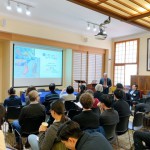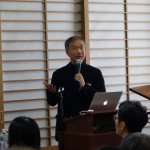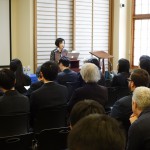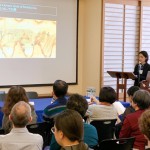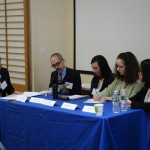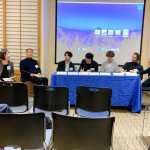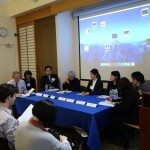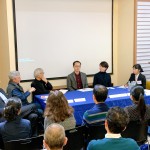International Symposium & Workshop in Japanese Literary & Visual Studies
On February 28 (Fri.) and 29 (Sat.), the Global Japanese Studies Model Unit held an international symposium/workshop, cosponsored by Columbia University’s Department of East Asian Languages and Cultures, titled “International Symposium & Workshop in Japanese Literary & Visual Studies.” It was an eventful two days during which faculty members and graduate students came together to discuss a wide range of topics concerning Japanese literature and Japanese art history.

At the workshop organized by graduate students titled “New Currents in Japanese Literary and Visual Studies,” participants from University of Tokyo and Stanford University joined those from Waseda University and Columbia University to exchange views across national, institutional, and disciplinary boundaries. After a series of 15-minute presentations given in English, there was a question and answer period conducted in both Japanese and English. A multitude of points for discussion and methods of research were brought up, seeming to foreshadow the appearance of new currents in the humanities. In the domain of literature, the graduate students ventured into a forest of texts, passing through the tales and waka poetry of the Heian Era and the setsuwa stories and founding shrine and temple legends of Japan’s medieval and pre-modern periods into a lush grove of modern figures, such as Futabatei Shimei, Shuko Chikamatsu, Junichiro Tanizaki, Raicho Hiratsuka, Yanagi Soetsu, and Riichi Yokomitsu. In the domain of art, the graduate students explored a visual labyrinth including Buddhist and Zen paintings, scrolls detailing the founding of temples and shrines, the Rakuchu Rakugai folding screens of Kyoto, illustrations of the hellish Buddhist realms of Naraka, and ukiyo-e depictions of skeletons. Those studying both gazed intently at the points of interest in one another’s domains, and time seemed to pass in an instant.
During the preparation stage, we had our concerns about whether this group of graduate students who spent their days studying different disciplines—literature and art history—and who came from different countries—Japan and the US—would be able to conduct the workshop smoothly, but our fears turned out to be unwarranted. Each difference was precisely what gave rise to boundless curiosity; the participants were fully capable of relativizing their own studies. We sincerely hope that this experience will serve as the fuel that allows them to achieve even greater developments in their future research endeavors.

Metropolitan Museum of Art
Reports written by the graduate students who participated in the workshop are posted here. The Global Japanese Studies Model Unit intends to continue to engage in initiatives such as this one and would be thrilled if those aspiring to study and research the humanities were to read them.
Finally, we would like to express our most profound gratitude to all those who generously provided their considerable assistance in organizing this symposium and workshop: Professors Haruo Shirane, Tomi Suzuki, David Lurie, and Matthew McKelway of Columbia University; Columbia’s Donald Keene Center and Mary Griggs Burke Center for Japanese Art; and the Metropolitan Museum of Art, which most graciously provided exhibitions and tours.
Text overseen by: Professor Satomi Yamamoto, Faculty of Letters, Arts and Sciences
Reports by graduate students
*The language in which each report is published is that in which it was submitted.
■Workshop: New Currents in Japanese Literary and Visual Studies■
Session 1
Phuong Ngo (Columbia University)
Ekaterina Komova (Columbia University)
Ye Yuan (Columbia University)
Session 2
Yuki Ishida (Columbia University)
Kevin Niehaus (Stanford University)
Rihito Mitsui (Waseda University)
Taiki Tomozoe (Waseda University)
Session 3
Yiwen Shen (Columbia University)
Shōhei Yamayoshi (Waeda University-Columbia DD program student)
Eri Nonaka (University of Tokyo)
Maria Yamada (Waseda University)
Session 4
Sakuya Okazaki (University of Tokyo)
Kaho Kakizawa (Waseda University)
Yeongik Seo (Columbia University)



